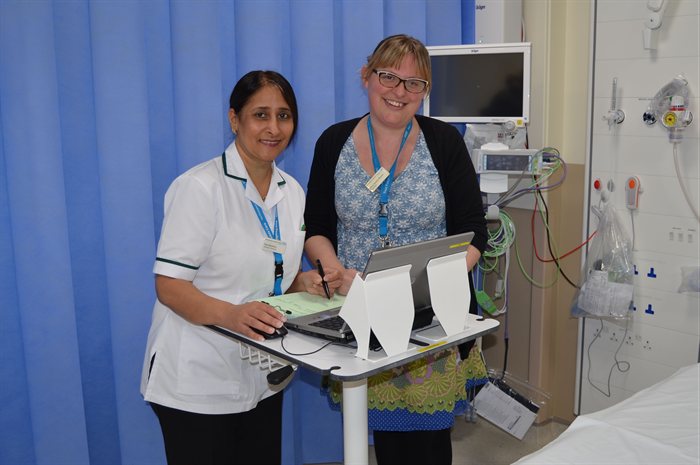Pharmacy staff join A&E to help reduce winter pressures

Medicines management technician Pam Bhambra and clinical pharmacist Anna Gordon Brown who are helping to deliver the new pharmacy service in A&E
Pharmacy staff have been introduced to Northampton General Hospital’s accident and emergency department during busy periods to support patients with better care when they’re in hospital.
Medicines management technician Pam Bhambra and clinical pharmacist Anna Gordon Brown have volunteered to work their normal weekday hours over the weekend as this is where pressure is normally highest. They support the A&E nurses, doctors and consultants to optimise the use of medicine, helping improve the flow through A&E and improving the level of care delivered to patients. The initiative also releases nurses’ time to concentrate on other clinical care.
Gill Williams is principal pharmacist, clinical services at NGH. She said: “By including experts on medicines in clinical teams it can reduce the potential for errors in prescribing and administration, reduce delays in getting medicines to patients, ensure patients are prescribed all of their regular medication and in some cases mean that patients’ problems can be sorted without them needing to be admitted to a ward.
“The use of medicines has become increasingly complex with many patients on multiple drugs. Pharmacists working within our A&E department can contribute directly to patient care in distinct ways. The A&E Pharmacy team’s focus will be to ensure that the right medicine is available at the right time for attending patients. They will also assist in the identification of medication issues and problems to improve both quality and safety.”
Recent work has shown that pharmacists working within the A&E team can help identify medication-related issues and also ensure medicines are swiftly supplied and communicated to GPs, preventing unnecessary delays for patients. It also means that, should patients need to be admitted to a hospital ward, the pharmacist can assess what they have been taking at the point of admission, preventing delays in patients receiving essential treatment, reducing omitted doses and lessening delays on discharge.
The new development, which has been made possible by the government’s extra ‘winter pressure’ funding for the NHS, has been welcomed by clinical staff in the department as well as being appreciated by patients.
Gill said: “Our pharmacy staff saw 700 patients in November 2014, ensuring more patients are reconciled with their medicines on the admission wards. This has released the medicines management technicians on the wards to focus on other patients in the hospital and manage their discharge.
"I believe there is a greater potential for their role to be developed, both through managing common ailments and in freeing up doctors and nursing staff to conduct their clinical work - particularly when the hospital is under so much pressure. The challenge for us is to invest in this scheme in the long term so that all patients, and accident and emergency staff, can benefit throughout the year.
“Patients want to be involved and informed about the medicines they take and not to have to wait for supplies on discharge. This pharmacy initiative will benefit patients attending A&E who do not need to be admitted, as well as patients who are.”
The Royal Pharmaceutical Society (RPS) believes that pharmacists are an underutilised resource in the delivery of better urgent and emergency care for patients. In a report called Shaping pharmacy for the future, published last September, the RPS advocated the consideration of this development in all hospitals.
Posted on Tuesday 9th May 2017